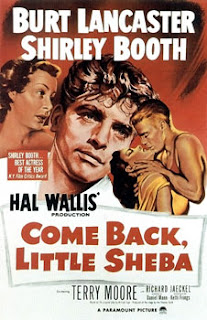Come Back, Little Sheba
Come Back, Little Sheba is a 1952 film of social realism by director Daniel Mann, based on the Tony Award-winning play by William Inge. Shirley Booth, who won the Tony for the Broadway production, also won an Oscar in her film debut.
Booth plays a frumpy middle-aged woman who is extremely happy-go-lucky and is eager to please. Of course this demeanor hides pain--her husband, Burt Lancaster, is an alcoholic, celebrating his first year of sobriety. But you get the sense that Booth walks on eggshells around him, fearing that he will fall off the wagon at any time. She also can't dismiss the belief that he only married her because he got her pregnant, with a baby that later died.
The story begins when Booth rents a room to a young college student, Terry Moore. Lancaster doesn't want anyone in the house, but when he gets one look at her he changes his mind. Throughout the film his paternalism, which is probably thinly-disguised lust, drives him toward the bottle of whiskey in the kitchen cabinet.
The title refers to a missing dog, that Booth calls for everyday, knowing deep down that the dog is gone for good. This is a metaphor for her lost dreams. The marriage seems sexless, and while Lancaster does show her affection it's clear that she is more in love with him than he is with her. Viewed through the lens of today's attitudes about roles played in marriage, Lancaster is an emotional abuser.
I found the sexual tension between Lancaster and Moore interesting, a kind of lifting of the rock on '50s suburbia. Moore is oblivious, seeing Lancaster as a father figure, but he takes far too much interest in her dating a jock (Richard Jaeckel) who only want to get in Moore's pants. Lancaster is right about Jaeckel, but his motives are suspect.
The film belongs to Booth. She was a well-known actress of the stage when she made this film, her first, in her fifties. She only made four other movies, but became well known for a long-running TV series, Hazel. Her performance is heartbreaking, and reminds us that for every woman we may see like her in the supermarket, there is a story there.
Though she and Lancaster are excellent (when was he not) I think he was miscast. Lancaster was fifteen years younger than Booth, and it shows. He seems too dashing to be in such a role. But otherwise, this is a fine film.



Comments
Post a Comment